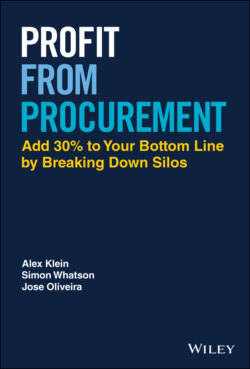Читать книгу Profit from Procurement - Jose Oliveira Valentede - Страница 16
2 AMBITION: Ensuring You Are Set Up for Success A Dirty Procurement Word
ОглавлениеI attended a Procurement panel event last year where the audience was putting questions to half a dozen senior and well-respected people from the Procurement profession. The audience was itself full of successful Procurement people, and it's one of those evenings where you learn a lot about the profession.
The theme of the evening was the future of Procurement and what people should be considering when deciding on the next priorities for their function. In other words, What should Procurement's ambition be?
Most of the panel were CPOs from large companies—a couple of the brands were household names. The panel had been generally agreeable up until that point, but thankfully it contained a couple of characters who are known to hold strong views and not to be shy about voicing them.
One question and answer round I found particularly fascinating was when the following question was asked: “Do you think that Procurement should be measured on savings?”
Now, the first reason I thought this was interesting was because of the way the question was asked. The questioner might as well have added the words “surely not!” at the end, such was the tone used. It's funny because savings (or any other word to denote monetary benefits) has become a bit of a dirty word in Procurement in recent years, as if people in the profession are ashamed to talk about it.
It's certainly less fashionable to talk about savings at events such as these, where surely there must be some new and exciting things for Procurement to aspire to after all these years!
Perhaps that is because sometimes savings programs have failed, or CPOs have been unable to translate savings into wider business-speak and therefore constantly come up against internal brick walls. Then there are the CFOs who have “learned never to trust a Procurement savings number.” So, all of a sudden, we have an entire industry nervous to associate themselves with the thing they all thought they specifically existed for just a few years ago. It's an interesting phenomenon, and I was eager to see how the debate would play out.
First up was the successful CPO of one of the world's largest engineering services company. She immediately declared that her function was “past that.” Indeed, apparently her latest Procurement strategy didn't even have a savings number in it. She went on to explain that the success metrics they use are engagement level with the business, automation, and quality. Finally, and only as she was offering some closing thoughts, did she admit that savings were sometimes used as a metric, but only “where appropriate” and for certain projects.
The microphone was then passed to the CPO of a water utility to answer the same question. He seemed to be just as keen not to be seen as a savings CPO. I think we are “way past that,” he said. Apparently, his function gets measured on many other elements such as customer satisfaction, supply chain satisfaction, sustainability, and even carbon neutrality. But then he too began to introduce a bit of nuance towards the end of his answer.
“I think many CEOs and CFOs see savings as a given,” he said. “You have to be, and remain, cost competitive in the market,” he explained, before adding, “I think other types of value are secondary to that, in reality.” With that final comment his voice trailed off, and he appeared to brace himself for reaction from the audience and his fellow panelists. After all, he had just done a bit of a U-turn and sort of admitted to a hundred of his peers that savings were in fact the number one priority of his function!
The third speaker nailed it, for me. He was the CPO of one of the large supermarket chains in the UK; he spoke confidently. “The fact is, savings are important,” he explained. “If you inherit a Procurement team that doesn't have a standing in the business then your ability to get credibility rests on setting a three-year value for money improvement, call it savings if you like, and achieving it.” He said that once you deliver that, you then get permission to expand into things such as driving innovation in the supply chain, having goals around supplier satisfaction and all the other worthy goals a Procurement team should aspire to as well. He then talked some more, but was simply re-emphasizing his central point that the only way to get credibility in the organization first as a CPO is to drive cost improvements.
Yes, there are other things that the Procurement function can and should eventually do to add value in ways beyond savings, but they come second.
